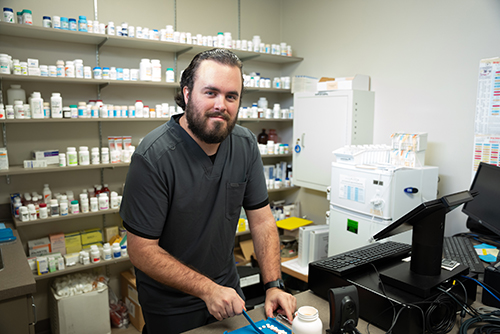
Contact the Pensacola State College Allied Health Department for assistance in planning your program of study.
RELATED DOCUMENTS
RELATED LINKS
- About PSC's Health Related Programs
- Pharmacy Technician Information Packet
- Bureau of Labor Statistics, Pharmacy Technician page
- Florida Board of Pharmacy
- Health Sciences Learning Center
- National Pharmacy Technician Association
- Pharmacy Technician Certification Board
SITE LINKS
SEARCH PROGRAMS
INTRODUCTION
The program prepares graduates to work in both institutional and community pharmacy settings under the supervision of a pharmacist. Pharmacy technicians assist pharmacists in dispensing medications and are accountable to the supervising pharmacist who is legally responsible through state licensure for the care and safety of patients served by the pharmacy.
Pharmacy technician job duties include providing medication and other health care products to patients and working with third party agents and physicians in resolving adjudication of patients’ insurance or state program. Pharmacy technicians often do the routine tasks associated with preparing and providing prescribed medications to patients, but may also do compounding of medications, doctor calls, expense and medication orders, returns and expired credits, and non-licensed pharmacy management. State rules and regulations as well as job policies and procedures define the functions and responsibilities of pharmacy technicians.
Special Admission Requirements
Student enrollment in the program is limited. The number of students in each class shall be determined by the availability of space, equipment, qualified faculty, and institutional and community clinical facilities necessary for a meaningful education. Only one class per year is accepted. Program acceptance is based on selection from all qualified applicants meeting the minimum criteria on a first-qualified/first-seated basis. All applicants who meet the established criteria will be accepted into the program. However, not all will be guaranteed seats in the class of their choice if the application is not completed in a timely fashion.
Minimum requirements for eligibility to the program include high school diploma or GED. Applications for both the College and program must be on file. Applicants must be at least 17 years of age. When the student has met the program admission requirements, the student’s application is evaluated by the Office of Admissions and ranked according to the date on which the student completed the final requirement. Students are selected in that rank order.
IS THIS FOR YOU
People who enter this career are often described as “doers.” They are organizers who like physical hands-on activities and working with charts and reports. They enjoy a friendly environment, have a cooperative attitude, and want to be of service to others. This career attracts persons who are reliable and dependable and are willing to take on responsibilities and challenges.
BEYOND GRADUATION
Pharmacy Technicians are required to obtain a State of Florida registration and encouraged to take a national certification exam. Registration and certification requirements vary by state.
| Graduate Performance | |||
| Graduating Year | Program Completion Rate | Certification Exam Pass Rate | Employment Rate |
| 2022 | 100% | 100% | 75% |
| 2023 | 50% | 100% | 100% |
| 2024 | 100% | 75% | TBD |
RELATED CAREER OPPORTUNITIES
Primary Employers
Graduates from the Pharmacy Technician program work in hospitals and drug, general merchandise, and grocery stores.
Occupations
Pharmacy Technicians
Work under the supervision and direction of a registered pharmacist. They must maintain good organizational skills in an environment where keeping things neat and organized is essential for patient safety. Technicians receive and store incoming supplies, and maintain proper storage and security conditions for drugs. They answer telephones, responding to questions or requests, and help customers by answering simple questions or referring them to the pharmacist. They receive written prescription or refill requests and verify the information. They file prescriptions that have been filled and establish and maintain patient profiles, including lists of medications taken by individual patients. In institutional settings, responsibilities can also compounding medications, compounding intravenous fluids for injection, and specialized patient treatments under the direct supervision of a pharmacist. Pharmacy technicians can also assist the pharmacist by reviewing current medications with patients and clarifying how the patients are taking medications at home to streamline the pharmacist’s consultation with the patient.

 PirateQ
PirateQ 